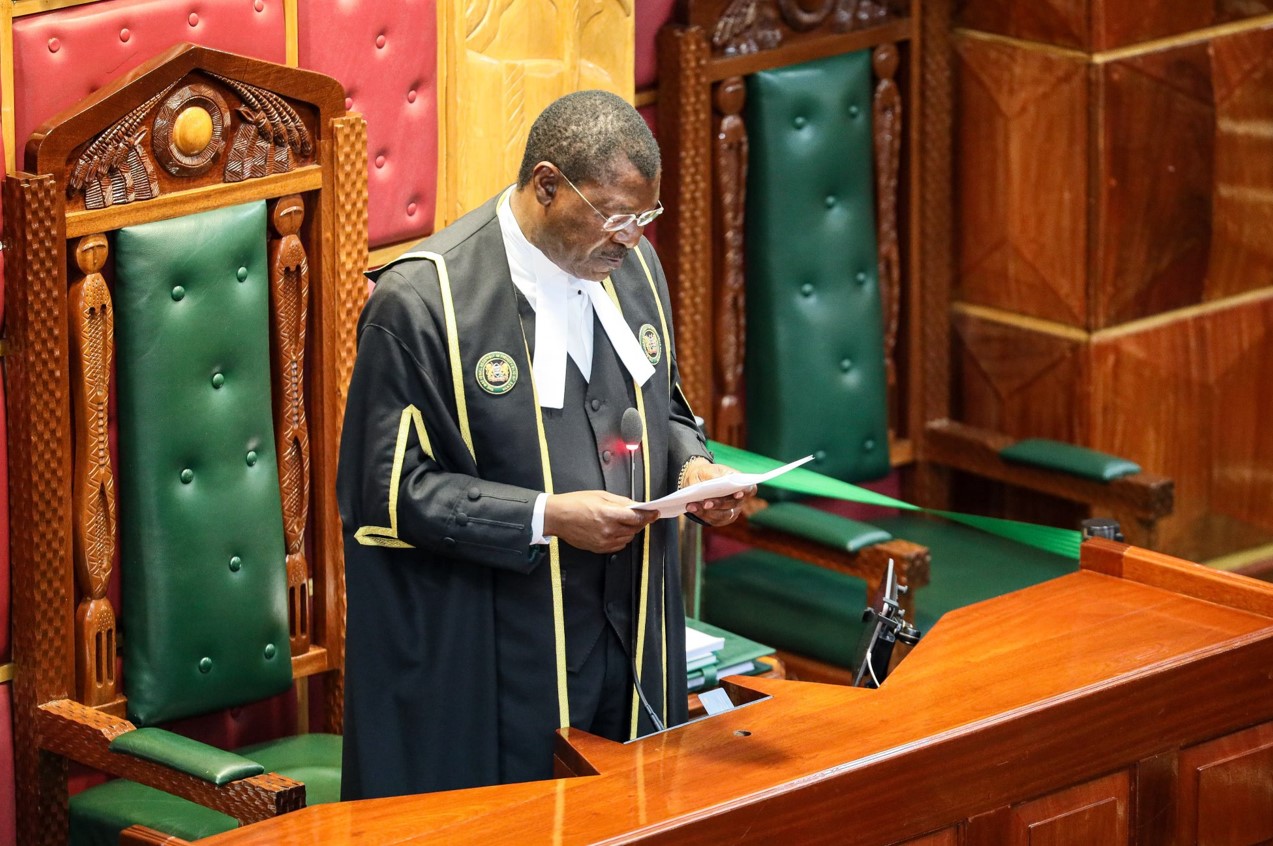Full in-tray for MPs as House resumes sitting on Tuesday

Speaking on Sunday, Speaker Moses Wetangula also stressed the urgent need to reconstitute the Independent Electoral and Boundaries Commission (IEBC) as Parliament resumes.
Members of Parliament in the National Assembly are set to reconvene on Tuesday, September 17, to deliberate on the vetting report for Inspector General nominee Douglas Kanja.
While the Senate has already approved Kanja's nomination, the joint vetting process requires the National Assembly to make its decision as well.
More To Read
- IG Douglas Kanja urges court not to issue orders over political activity claims
- Court declines to issue arrest warrants in Mwenda Mbijiwe disappearance case
- IG Douglas Kanja assures Kenyans of heightened security ahead of festive season
- Over 7,000 Kenyans register in first four days as IEBC launches new biometric system
- IG Douglas Kanja faces grim reality of Kwa Binzaro exhumations
- Five Kenyans sue IG Douglas Kanja, top security chiefs over protest violence inaction
In addition to Kanja’s appointment, MPs will also review the report on the vetting of David Kibet Kemei, nominated for the position of Director General of the Competition Authority.
The session will also feature significant discussions around budget-related legislation. Parliament is expected to consider two important Bills focused on the division of funds between the national government and county administrations.
One of the primary items on the agenda is The Division of Revenue (Amendment) Bill, 2024, which proposes adjustments in the allocation of revenue between the national and county governments.
This move follows the rejection of the Financial Bill, 2024, largely due to widespread anti-government protests, particularly among young people. The new proposal aims to address the shortfall in projected revenue for the 2024/2025 financial year.
Having already passed through the National Assembly, the Bill has been referred to the Senate for consideration and will return to the Assembly once the Senate concludes its discussions. However, county governments have already expressed opposition to any reduction in their shareable revenue.
President William Ruto has urged the Senate to amend the County Allocation of Revenue Act (CARA) 2024, suggesting a reduction in county revenue from Sh400.1 billion to Sh380 billion for the 2024/2025 financial year.
The new figure is Sh5 billion less than the Sh385 billion allocated to counties in the previous fiscal year, a move the President deems necessary under the country’s current austerity measures.
Bills' review
The House will also be tasked with reviewing four key Bills, including the Conflict of Interest Bill, 2023, the Sugar Bill, 2022, the Water (Amendment) Bill, 2023, and the National Rating Bill, 2022.
 National Assembly Speaker Moses Wetang'ula reads his communication in the House chambers on July 23, 2024.(Photo: National Assembly)
National Assembly Speaker Moses Wetang'ula reads his communication in the House chambers on July 23, 2024.(Photo: National Assembly)
The Conflict of Interest Bill aims to establish clear guidelines for managing conflicts of interest in public service. It defines situations where private interests could potentially interfere with impartiality in official duties.
Meanwhile, the Sugar Bill proposes reinstating the Sugar Act, which was repealed through the Crops Act, 2013. The legislation also seeks to restore the functions of the Kenya Sugar Board, currently managed by the Sugar Directorate of the Agriculture and Food Authority under the Agriculture and Food Authority Act, 2013.
The Water Amendment Bill focuses on amending the Water Act, 2016, to promote public-private partnerships in the water sector.
Additionally, the National Assembly will consider two Bills originating from the Senate: the Employment (Amendment) Bill, 2022, and the Natural Resource Benefit Sharing Bill.
Sponsored by Nandi Senator Samson Cherarkey, the Employment Bill aims to restrict employers from contacting employees outside of working hours.
The Natural Resource Benefit Sharing Bill, sponsored by Tana River Senator Danson Mungatana, seeks to establish a framework for sharing benefits derived from natural resource exploitation between the national government, county governments, local communities, and resource exploiters.
The parliamentary session will run for 10 weeks, after which MPs will break for recess on December 5.
Speaking on Sunday, Speaker Moses Wetangula also stressed the urgent need to reconstitute the Independent Electoral and Boundaries Commission (IEBC) as Parliament resumes.
Wetangula expressed concern over delays in boundary reviews and by-elections, saying, “We cannot afford further delays on boundary reviews or pending by-elections in our wards and constituencies. I urge those obstructing this process to reconsider their stance and allow the country to move forward.”
The reconstitution of the IEBC has stalled due to a court order barring Parliament from submitting names of potential appointees to President Ruto. This came after the Azimio la Umoja coalition contested the original list of nominees, seeking to replace Augustus Muli with Koki Muli.
Wetangula also called on Chief Justice Martha Koome to expedite the court cases surrounding the IEBC, emphasising the importance of resolving the disputes quickly to avoid further disruptions.
“I want to encourage those making challenges in court to rethink their actions and allow this process to proceed,” he added.
The reconstitution panel will comprise nine members, with nominations already submitted by bodies such as the Evangelical Alliance of Kenya and the National Muslim Leaders Forum.
However, the Law Society of Kenya and the Parliamentary Service Commission are yet to submit their nominees.
The process has become more urgent following the retirement of former IEBC Chair Wafula Chebukati and other commissioners, alongside the removal of those who had challenged the 2022 Presidential election results.
Top Stories Today












































